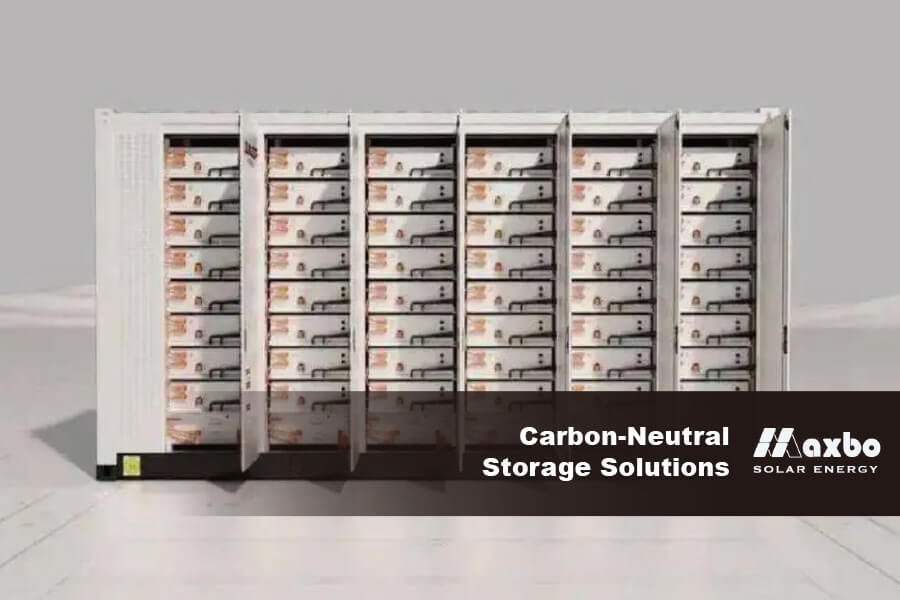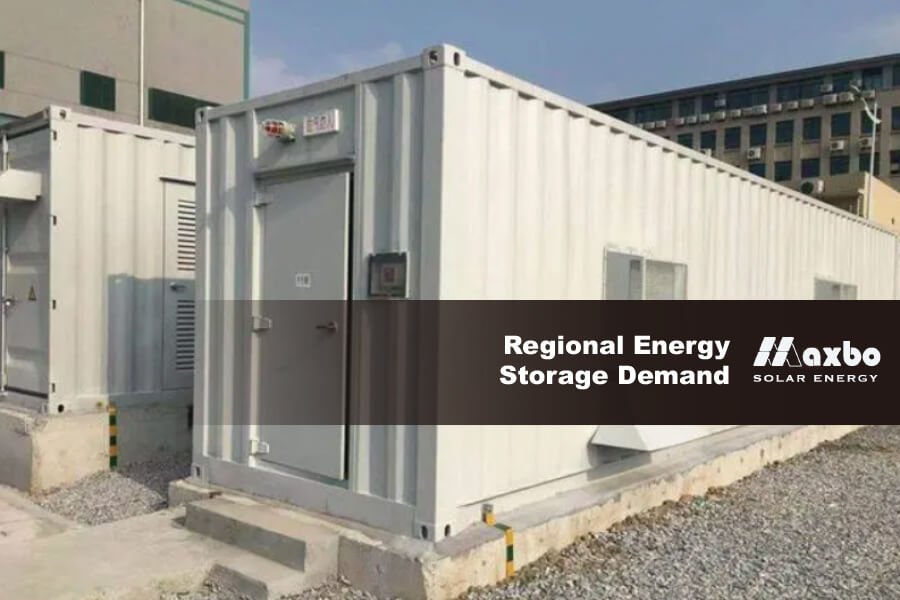At Maxbo, we understand the unique needs of off-grid homeowners. When you’re living off the beaten path, having a reliable energy storage system is crucial. In this comprehensive guide, we’ll explore the energy storage system for off-grid homes, detailing everything you need to know to make an informed decision. From understanding the benefits to evaluating costs and choosing the right system, we’ve got you covered.
Table of Contents
ToggleThe Importance of Energy Storage Systems for Off-Grid Homes
Why Off-Grid Homes Need Energy Storage Systems
Living off the grid means you’re not connected to traditional power sources, so managing your energy needs becomes even more critical. An energy storage system for off-grid homes offers several advantages:
- Reliability: It ensures a continuous power supply even when solar or wind energy is not being generated.
- Energy Independence: You gain greater control over your energy usage and can reduce reliance on backup generators or fuel.
- Cost Savings: By optimizing the use of stored energy, you can lower your overall energy costs and reduce your environmental footprint.
Understanding these benefits highlights why selecting the right energy storage system for off-grid homes is essential for efficient and sustainable living.
Key Factors Influencing the Energy Storage System for Off-Grid Homes
1. Battery Technology
The type of battery you choose can significantly affect the performance and cost of your energy storage system for off-grid homes:
- Lithium-Ion Batteries: These are popular due to their high efficiency, long lifespan, and compact size. They tend to have a higher upfront cost but offer excellent performance.
- Lead-Acid Batteries: A more traditional option, lead-acid batteries are generally less expensive but have a shorter lifespan and require more maintenance.
- Flow Batteries: Suitable for larger installations, flow batteries offer long cycle life and high capacity, though they are less common for residential use.
Choosing the right battery technology will impact both the cost and efficiency of your energy storage system for off-grid homes.
2. System Capacity
The capacity of your energy storage system is crucial for meeting your energy needs:
- Small Systems: Ideal for modest energy requirements, small systems are typically less expensive but may not support all of your power needs.
- Large Systems: For extensive energy needs or larger off-grid homes, a larger system provides greater storage capacity and longer-lasting performance.
Assessing your energy needs and selecting an appropriately sized energy storage system for off-grid homes will help you avoid overpaying for unnecessary capacity or underestimating your requirements.
3. Installation and Integration
The installation process is a critical component of your overall energy storage system for off-grid homes cost:
- Installation Costs: These can vary based on the complexity of the system, the type of batteries, and the specifics of your off-grid setup. Installation typically involves connecting the battery system to your energy sources, such as solar panels or wind turbines.
- Integration: Proper integration ensures that your storage system works seamlessly with your existing energy infrastructure. This might involve additional equipment, such as inverters and charge controllers.
Considering these factors helps you budget accurately for the full energy storage system for off-grid homes.
4. Maintenance and Lifespan
Maintenance and lifespan are important considerations for the long-term cost of your energy storage system for off-grid homes:
- Maintenance Needs: Regular maintenance is necessary to keep your system running efficiently. Some systems, particularly lead-acid batteries, require more frequent maintenance compared to lithium-ion batteries.
- Battery Lifespan: The lifespan of your battery system will impact its overall cost. Batteries with longer lifespans may have a higher initial cost but provide better long-term value.
Evaluating these factors will help you understand the total cost of ownership for your energy storage system for off-grid homes.
Cost Breakdown of Energy Storage Systems for Off-Grid Homes
1. Initial Costs
The initial costs are the most significant part of the energy storage system for off-grid homes:
- Battery Costs: Prices vary based on the type and capacity of the batteries. For example, lithium-ion batteries typically cost between $500 and $1,000 per kilowatt-hour (kWh), while lead-acid batteries are generally more affordable.
- Inverter Costs: An inverter is necessary for converting stored energy into usable power. Inverter costs can range from $1,000 to $3,000, depending on the system’s capacity and features.
- Installation Costs: Installation costs depend on the complexity and size of the system. Average costs range between $1,000 and $5,000.
2. Ongoing Costs
Ongoing costs include maintenance and potential replacements:
- Maintenance: Regular maintenance is required to ensure optimal performance. This can include checking battery levels, cleaning terminals, and ensuring proper ventilation.
- Repairs and Replacements: Over time, parts of the system may need repair or replacement. Budgeting for these potential costs is important for long-term planning.
3. Energy Savings
The energy savings achieved by using a storage system can offset some of the initial costs:
- Reduced Fuel Costs: By relying less on backup generators or external power sources, you can save on fuel costs.
- Government Incentives: Look for available incentives or rebates for installing energy storage systems, which can help reduce overall costs.
How to Optimize Your Investment in an Energy Storage System for Off-Grid Homes
1. Choose the Right System
Selecting the best system for your needs involves:
- Assessing Your Energy Needs: Determine your energy consumption patterns and storage requirements to choose the most appropriate system.
- Comparing Options: Evaluate different battery technologies, system sizes, and providers to find the best fit for your budget and energy needs.
2. Work with Experts
Partnering with experts ensures a smooth installation and optimal system performance:
- Consult with Maxbo: Our team at Maxbo offers expert consultations to help you choose and install the best energy storage system for your off-grid home.
- Get Multiple Quotes: Obtain quotes from various providers to ensure you get the best deal and value for your investment.
Maxbo’s Energy Storage Solutions for Off-Grid Homes
At Maxbo, we offer a range of high-quality energy storage solutions designed to meet the unique needs of off-grid homes:
- Maxbo Lithium-Ion Batteries: Known for their efficiency and long lifespan, these batteries are an excellent choice for off-grid applications.
- Maxbo Hybrid Systems: Our hybrid systems offer flexibility and high performance for various off-grid setups.
- Maxbo Installation Services: Our expert team ensures a seamless installation process, optimizing your energy storage system’s performance.
For more information and to explore our products, visit Maxbo’s website.
Resources and References
For additional information on energy storage systems for off-grid homes, consider the following authoritative resources:
- International Renewable Energy Agency (IRENA)
- U.S. Department of Energy – Energy Storage
- European Commission – Energy Storage
- National Renewable Energy Laboratory (NREL)
- Energy Storage Association
- Solar Energy Industries Association (SEIA)
- Renewable Energy World
- Clean Energy Review
- Energy Storage News
- Solar Power Europe
Conclusion
Investing in an energy storage system for off-grid homes is a significant decision that can greatly enhance your energy independence and efficiency. By understanding the key factors influencing costs, including battery technology, system capacity, installation, and maintenance, you can make an informed choice. At Maxbo, we are committed to providing you with high-quality products and expert guidance to optimize your off-grid energy solution. Contact us today to find out how we can help you achieve your energy goals.
Related Solutions
Related Blogs
Grid-Forming BESS Container Europe: Crushing NC RfG 2.0 & Keeping Europe’s Lights (and Espresso Machines) On
行政2025-12-19T14:07:50+08:00December 18th, 2025|Categories: Design, News|
Electric Vessel Charging BESS Container Europe: The Grid-Saving Hero Powering Zero-Emission Maritime
行政2025-12-19T14:09:32+08:00December 18th, 2025|Categories: Design, News|
Let’s Make Things Happen
Add notice about your Privacy Policy here.
Let’s Make Things Happen
”The Maxbo team of sales consultants will continue to enrich our own expertise and experience to empower the development of sustainable energy with rigor.“
Maxbo CEO
You will need to provide: 1. the amount of electricity used. 2. the type and power of the load. 3. the electricity consumption habits (daytime/nighttime consumption). 4. the need to store electricity. 5. the need to feed electricity to the mains. 6. drawings or address of the installation site. 7. other special requirements
We can provide you with a quotation, a specification for all products, a circuit connection diagram and a diagram of the installation and placement of the PV panels. Any other requirements and adjustments needed can be discussed with our team.
We can meet the needs of most scenarios, whether your application is for domestic, commercial and industrial use, in remote areas, or for grid-level energy storage, we have experienced colleagues to design and deliver the right solution.
Add notice about your Privacy Policy here.
How much solar power do I need?
Most homes need 5–12kW, depending on your energy use and location.
Off-grid vs. grid-tied — what’s the difference?
Off-grid works without the utility grid; grid-tied lets you sell extra power back.
Do I need permits?
Usually yes — check local rules or ask us for guidance.
How long does a battery last?
Depends on size and load. A 5kWh battery can power a fridge for about 40 hours.
Can I upgrade my system later?
Yes, our systems are modular and easy to expand.
Does Maxbo offer installation?
We ship globally and connect customers with trusted local installers.










